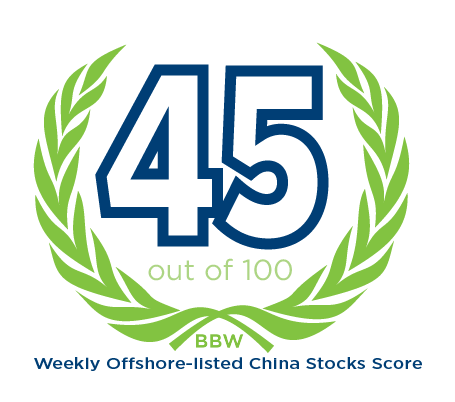CHINA BULLETIN: Big Data Gets a Break


In this week’s issue big data catches a break, Evergrande’s restructuring stalls, and a fading sports brand tries its hand at grain trading. On a scale of 1 to 100, we give the week a 45 for offshore-listed China stocks.
Doug Young, Editor in Chief
You can sign up to get China Bulletin weekly in your inbox.
MACRO
Big Data Gets a Break
Of all the things that scare foreign businesses in China these days, the nation’s growing obsession with data security is one of the highest on the list. After more than a year of tightening security in this key area, Beijing has suddenly taken a step back by releasing draft measures that would significantly roll back recent rules for cross-border data transfers.
Among other things, companies would no longer need to apply for permission to transfer their China-based data outside the country, though they could be requested to do that if regulators independently determine their data is important enough. That was a huge concern before, and shows economic growth is finally gaining more equal footing with national security.
U.S. Sends Senators to China, Warns of More Export Curbs
It may not be the kind of win-win warm, fuzzy feeling that China likes, but the U.S. seems determined to put its relationship with Beijing back on more stable footing with a certain new degree of pragmatic realism. In the latest step in that direction, a group of U.S. senators will visit Beijing this week, where they are seeking a meeting with President Xi Jinping.
Separately, the U.S. has warned China to expect an updated list of export curbs later this month, refining earlier rules first released last year. We don’t know what the senators will discuss, but it’s probably safe to say they’ll raise a wide range of concerns to show their toughness on China. Similarly, the new export curb rules won’t be pleasant, but at least China knows they’re coming.
No Holiday for China Stocks
Much of China was on holiday last week for the country’s weeklong National Day break last week, but the picture wasn’t as sanguine for offshore-listed Chinese stocks that continued to trade. The Hang Seng China Enterprises Index has lost 4.6% over the last two weeks, while the iShares MSCI China ETF is down 2.1%, and the broader Hang Seng Index has shed 3.2%.
The Hang Seng Index actually hit a low for 2023 last week, and it would have been a low not seen since 2009 if not for a brief massive selloff a year ago that achieved that record. Last year’s selloff was quite fleeting and was followed almost immediately by a major rally. But we’re skeptical that will happen again this time as growing signs of gloom continue to build over the Chinese economy.

Industry
New Home Prices Tick Up
It wasn’t all gloom and doom last week, with at least one small piece of good news coming from the nation’s embattled property sector. New home prices eked out a tiny 0.05% month-on-month gain in September, ending four months of declines. Of course, that doesn’t say anything about sales of existing homes, which don’t typically fetch as strong prices as new ones.
Separate reports show some new steps the public and private sectors are taking to shore up this vulnerable market that looks set to drag China into its worst economic slump in decades. One saw leading home broker Lianjia slash its commissions in the important Beijing market to boost sales, while another saw the city of Chengdu ease home buying restrictions in some districts.
Travelers Shun Global Vacations
Masses of Chinese travelers took to the road during the weeklong National Day holiday, but they’ve been far less enthusiastic about traveling abroad. A new survey conducted in September showed that only 54% of China’s most seasoned travelers said they plan to go abroad this year, down from 62% who answered that way to a similar question in June.
The survey also showed that 22% of respondents had no plans to go abroad for the next three years, up from just 6% in June. Global travel was already hurting due to a lack of flights, which have been slow to come back since China reopened less than a year ago. Now, it seems higher prices for global travel are also dampening demand in the current environment of economic uncertainty.
Kroll Exec Barred from Leaving China
Another week, another foreign executive barred from leaving China. This time it was Michael Chan, a Hong Kong-based managing director from the U.S. risk advisory firm Kroll, who has been prevented from leaving China. Chan informed his employer of his situation, and said he has been assisting in an investigation for a case dating back a few years.
Unlike some of the other people who have been detained, Chan is still working and can freely move about China. And we should note that similar actions against U.S. firms Mintz Group and Bain & Co. don’t appear to have resulted in any arrests of their employees. But such moves, combined with all the recent focus on national security, aren’t particularly reassuring to foreign businesses.

Company
Evergrande Restructuring Stalls as Chairman Gets Investigated
After appearing to make some substantial progress in its reorganization, embattled property developer Evergrande is once again falling into the doghouse with both its creditors and also Chinese officialdom. The company scrapped a meeting with its creditors late last month after it became apparent they wouldn’t accept its latest terms to reorganize Evergrande’s debt.
Then, Evergrande’s Chairman Xu Jiayin was suddenly hauled away by the police, with reports saying he is suspected of illegally transferring assets abroad, even as his company struggles to complete many of its stalled projects. This really does look like the start of a new downward spiral for Evergrande, since it will be hard for Xu to do much when he’s sitting in a jail cell.
Huawei Unveils More Products That Skirt U.S. Sanctions
At first embattled tech giant Huawei was being low-key with its unveiling of a new smartphone that appeared to find a way around U.S. sanctions that deprived the company of cutting-edge chips to power its handsets. Now Huawei appears to be getting a bit more brazen with its recent unveiling of more products that appear to be made with its own high-tech chips.
Some reports have suggested Huawei is working with a network of chip companies, mostly from Taiwan, to skirt the U.S. sanctions. Huawei was previously working with another Taiwan company, TSMC, to manufacture its self-designed chips. So, finding other partners to do this work shouldn’t be too difficult, though the quality of their work may not be as high.
Ford Halts Construction of China-backed Battery Plant
A China-backed electric battery plant under construction in the U.S. has become a lightning rod for controversy, showing the American backlash to anything with China ties from this cutting-edge industry. Construction of the $3.5 billion plant, being built by CATL to supply Ford, was suddenly halted late last month, while Ford determined if it could competitively operate the facility.
The U.S. House of Representatives had already begun investigating the plant in April, and warned Ford that it had until the end of last week to hand over information or face potential consequences. In this case the consequences don’t look that dire, and Ford is also facing bigger problems from a major union strike. Still, the future of this particular battery plant looks anything but certain.
AND FROM THE PAGES OF BAMBOO WORKS
| Fading Sports Giant Tries Its Hand at Grains Last week we brought you a very “made in China” story of a company called Guirenniao, whose name was once synonymous with trendy running shoes. But when that business started to fall behind a bumper crop of homegrown rivals, what did Guirenniao do? If you answered “grain trading,” then you’re probably one of the few people who understands how China works. The company’s strange move into grain trading came via the introduction of a major new shareholder, who convinced the company there was no future in shoes, but that there was lots of potential in grains. As a result, grain-trading revenue has quickly grown to become Guirenniao’s biggest breadwinner, as it quietly winds down its shoe business. |
| Boqii Ends ‘Ruff’ Three-Year Ride on the NYSE We also brought you the story of Boqii, a former highflyer that once dazzled investors with its potential to become top dog in China’s huge and growing pet market. The company was once worth about $1 billion when it floated shares on the NYSE in 2020, tempting investors with its leading position in a market forecast to be worth more than $60 billion by 2024. But it never realized that potential, and its shares moved steadily downward, dragging its market value down as well. Faced with a potential forced delisting after its market value hovered near the $15 million minimum requirement, the company announced last week it would voluntarily delist and move its shares to the smaller, more thinly traded NYSE American exchange. |






